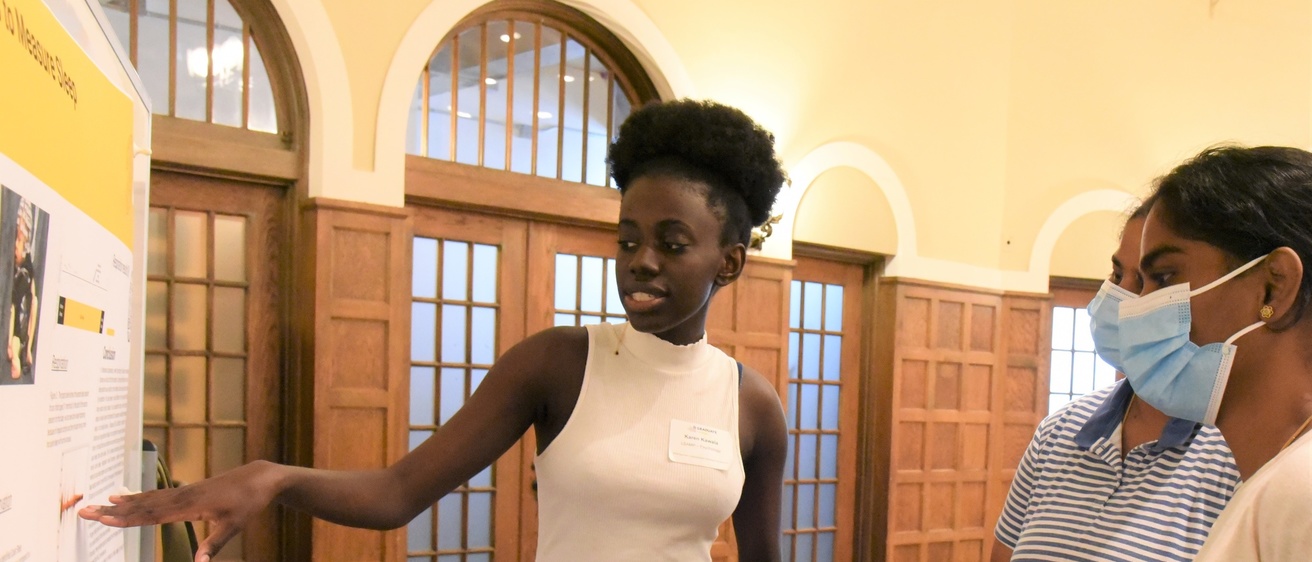The University of Iowa College of Liberal Arts and Sciences is expanding its outreach and engagement mission this year with the creation of the CLAS Engagement Hub. The hub will be anchored by the Magid Center for Writing and the Iowa Sciences Academy, and serve as the college’s official source for information, resources, and news about outreach and publicly engaged scholarship of CLAS faculty, staff, and students in the state of Iowa and beyond.
The Magid Center for Writing and Iowa Sciences Academy, which were previously part of the Division of Interdisciplinary Programs and the Department of Biology respectively, now report to CLAS administration. This move reflects the college’s commitment to writing, science education, and diversity and inclusion—benefiting the students and public that these programs engage.
“Both of these programs are doing phenomenal work for our students and the broader community, offering unique opportunities to develop important skills related to writing, communication, and research,” Dean Sara Sanders says. “Moving these programs administratively within our college will help them expand their reach to serve more students and reach more people here and across the state.”
The CLAS Engagement Hub will also encourage and highlight research and scholarship that engages with communities in Iowa and beyond by consolidating resources for faculty and integrating community-involved work in the college's education and research missions. “By pulling these resources into a central hub we are making the ways that faculty, staff, and students can incorporate engagement into their scholarship and teaching more visible. This enriches our mission by encouraging collaboration,” Associate Dean for Graduate Education and Outreach and Engagement Christine Getz says. “We also want to more intentionally support the community engaged scholarship of our faculty.”
The heart of the Writing University
As CLAS continues to lead the UI’s celebrated commitment to writing, the Magid Center for Writing is central in that mission.
“The Magid Center for Writing was founded in 2011 thanks to a generous gift from the family of the late Frank N. Magid, an Iowa alum and influential marketing consultant who believed that effective writing and communication skills are essential for all individuals—in their academics, in their careers, and in their lives,” Magid Center director Daniel Khalastchi says. “As an interdisciplinary program, joining the Engagement Hub allows us an even greater opportunity to deliver on the Magid family's vision and build on the success we’ve had over the last decade to ensure strong writing skills are accessible to all students at Iowa as well as the broader community.”
Since its creation in 2011, more than 400 students representing 70 different majors from 5 colleges have earned the Magid Center’s popular Certificate in Writing.
The Magid Center’s mission has expanded to become the home for established community-facing writing programs like the Iowa Young Writers' Studio and the Iowa Youth Writing Project, both serving K-12 students. The Summer Writing Festival also draws amateur and professional writers of all ages to Iowa and to its online programs from across the state and the country.
Supporting student success and outreach in the sciences
The Iowa Sciences Academy (ISA), formerly known as the Iowa Biosciences Academy, plays a unique role at the university in fostering hands-on research, professional development, and scientific communication and outreach opportunities for students.
Donor-supported programs like the Latham Science Engagement Fellowship help students develop fluency in communicating about science and research to the public, while NSF and NIH funded programs like UI-MARC and LSAMP support growth and success for a wide range of students interested in science career paths.
“We are so excited to be able to reach and serve even more students as a more integral part of CLAS,” ISA director and Associate Professor of Instruction in Biology Lori Adams says. “Science requires effective communication to reach and engage the public; ISA provides unique experiences for students to gain valuable training and mentoring to learn about research by doing it and then communicating its impact. These experiences really prepare our students for their next step, whether it is graduate school, working in academia, or pursuing private sector careers in science—this all benefits them, wherever they go next."
